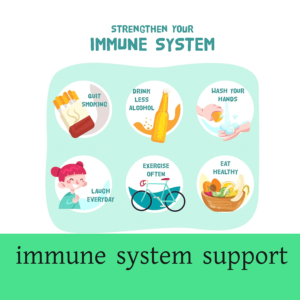Summery
Some studies suggest that a diet high in omega-6 fatty acids can increase the risk of inflammation and immune system malfunction. A cup of chicken soup has been shown to reduce inflammation and strengthen the immune system. Garlic, turmeric, carrots, broccoli, and citrus fruits are just a few examples of the antimicrobial fruits and vegetables that can help strengthen your immune system and ward off infections. Infections are more common in people with diabetes because of the effect that high blood sugar has on the immune system. Red wine, which is high in polyphenols, may be beneficial to health if consumed in moderation. Vitamin C, vitamin D, selenium, iron, and zinc are just some of the vitamins and minerals known to help strengthen the immune system.
Main Key points:
- Eat less red meat.
- Make sleep a priority.
- Manage your blood sugar levels.
- Lower stress with meditation.
- Eat less sugar and processed foods.
- Learn to Deal With Stress In Your Life.
- Supplements aid in the battle against infections.
- Increase your intake of antioxidant-rich foods on a daily basis.
- Take dietary supplements, especially omega-3 fatty acids, vitamins, and minerals.
- The fundamental reason for this is the effect that high blood sugar has on the immune system.
- Maintain regular blood sugar monitoring and take your medicines as prescribed to keep your immune system functioning normally.
- Experts agree that the best way to strengthen the immune system and enjoy all the health advantages of a healthy diet is to consume a balanced diet that includes foods high in omega-3 and omega-6 fatty acids.
To what end is immune system support and enhancement so crucial?
Immunity is the body’s first line of protection against foreign invaders; therefore, keeping it healthy and strong is crucial. Let’s have a look at some methods for improving our resistance to illness.
Eat less sugar and processed foods.
The immune system is weakened by the inflammation and gut flora imbalance brought on by refined and processed diets, especially junk food. A diet that is high in unsaturated fats, sugars that are hard to find, and processed meats can also weaken the immune system.
Improving your health and warding off illness
Don’t eat too many items that are high in omega-6 fats.
Consuming a diet high in omega-6 fatty acids, which are found in polyunsaturated fats like red meat and chicken, may increase the risk of inflammation and immune system malfunction, according to some studies. Experts agree that the best way to strengthen the immune system and enjoy all the health advantages of a healthy diet is to consume a balanced diet that includes foods high in omega-3 and omega-6 fatty acids.
Eat less red meat.
Increase your intake of antioxidant-rich foods on a daily basis.
Garlic, turmeric, carrots, broccoli, berries, and citrus fruits are just a few examples of the antimicrobial fruits and vegetables that can help strengthen your immune system and ward off infections. A cup of chicken soup has been shown in trials to reduce inflammation and strengthen the immune system.
Chicken soup is known to reduce swelling and pain.
Incorporate frequent physical activity into your routine.
Regular free-hand activities, cycling, brisk walking, and light running all benefit the immune system. It also helps to improve respiratory functions, build strong bones, and boost immunity.
A healthy immune system is one of the many benefits of regular exercise.
Make sleep a priority.
The likelihood of developing a cold, flu, or other illness, as well as experiencing physical pain, may all be heightened by little sleep. Therefore, getting between seven and eight hours of sleep per night might help boost one’s immunity.
A well-rested immune system is a well-functioning immune system.
Reduce your alcohol intake and stop smoking.
A number of autoimmune and immunological illnesses, including rheumatoid arthritis (joint aches) and lung infections caused by viruses and bacteria, are linked to cigarette smoking. Red wine, which is high in polyphenols, may be beneficial to health if consumed in moderation. However, because it kills off beneficial gut flora, alcohol intake has a negative effect on the body’s defenses against infectious illnesses.
Tobacco use is associated with an increased risk of several illnesses.
Take dietary supplements, especially omega-3 fatty acids, vitamins, and minerals.
Vitamin C, vitamin D, selenium, iron, and zinc are just some of the vitamins and minerals known to help strengthen the immune system. They play a key role in the development of immune cells, which in turn aid in the battle against infections. Well-documented omega-3 fatty acids also have antimicrobial and immune-boosting properties.
Supplements aid in the battle against infections.
Manage your blood sugar levels.
Infections are more common in people with diabetes, particularly those with type 2. The fundamental reason for this is the effect that high blood sugar has on the immune system. Maintain regular blood sugar monitoring and take your medicines as prescribed to keep your immune system functioning normally.
In order to keep the immune system functioning normally, blood sugar levels must be closely monitored.
Drink two to three liters of water per day to stay hydrated.
Staying hydrated aids in the elimination of waste products and the body’s ability to fight off diseases. Copper-enriched water, according to some research, improves digestion, immunity, and general health.
Detoxification is aided by drinking enough water.
Learn to Deal With Stress In Your Life.
There is evidence that chronic stress impairs the immune system, making it harder for the body to mount an effective defense against illness. Reducing stress and improving immunity may be accomplished through practices like meditation, yoga, and socializing with loved ones.
Lower stress with meditation.
Maintain clean personal habits at all times.
Wash or sanitize your hands after using the restroom, before preparing food, and especially after coughing or sneezing to prevent the spread of germs. By following these simple rules for personal cleanliness, you can stop the spread of disease and help your immune system work better.
